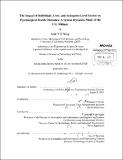| dc.contributor.advisor | Wiljeana J. Glover and Deborah Nightingale. | en_US |
| dc.contributor.author | Wang, Judy Y. H | en_US |
| dc.contributor.other | Massachusetts Institute of Technology. Technology and Policy Program. | en_US |
| dc.date.accessioned | 2012-01-12T19:28:29Z | |
| dc.date.available | 2012-01-12T19:28:29Z | |
| dc.date.copyright | 2011 | en_US |
| dc.date.issued | 2011 | en_US |
| dc.identifier.uri | http://hdl.handle.net/1721.1/68447 | |
| dc.description | Thesis (S.M. in Technology and Policy)--Massachusetts Institute of Technology, Engineering Systems Division, Technology and Policy Program, 2011. | en_US |
| dc.description | Cataloged from PDF version of thesis. | en_US |
| dc.description | Includes bibliographical references (p. 135-141). | en_US |
| dc.description.abstract | Post-traumatic stress disorder (PTSD) and other psychological health issues have emerged as a signature pathology of combat operations in Iraq and Afghanistan. However, the full continuum of care in the U.S. military for PTSD and related disorders is reported to be insufficient to meet the current and future needs of service members and their beneficiaries. The influence of external factors such as pre-traumatic risk factors and the availability of unit-level and enterprise-level resilience resources on eventual mental health outcomes have been previously considered individually, but not together in an enterprise-wide context. Although systems thinking has been applied to transform general health care systems in the United States and recommended for the military health system, there has been limited application of such ideas to the military health care system at large. This thesis expands on previous systems thinking work to transform health care systems in the United States by building a multi-level, dynamic model of the military psychological health enterprise from accession and deployment to future psychological health screening and treatment. The model demonstrates the relationships between stress, resilience and external unit-level and enterprise-level resources, and the influence of pre-traumatic risk factors, effectiveness of predeployment resilience resources and the availability of psychological health treatment in theater are evaluated using sensitivity analyses in order to formulate recommendations for upstream initiatives to improve downstream health outcomes. Increasing participation in pre-deployment resilience training and increasing unit support would have the largest effect on decreasing the number of service members predicted to develop symptoms of PTSD. Thus, it is recommended that the military consider fitting potential at-risk service members to resilience training, developing concurrent strategic short-term and long-term operational policymaking processes, and linking accession data to health outcomes to inform future psychological health policy creation. | en_US |
| dc.description.statementofresponsibility | by Judy Y. H. Wang. | en_US |
| dc.format.extent | 141 p. | en_US |
| dc.language.iso | eng | en_US |
| dc.publisher | Massachusetts Institute of Technology | en_US |
| dc.rights | M.I.T. theses are protected by
copyright. They may be viewed from this source for any purpose, but
reproduction or distribution in any format is prohibited without written
permission. See provided URL for inquiries about permission. | en_US |
| dc.rights.uri | http://dspace.mit.edu/handle/1721.1/7582 | en_US |
| dc.subject | Engineering Systems Division. | en_US |
| dc.subject | Technology and Policy Program. | en_US |
| dc.title | The impact of individual-, unit-, and enterprise-level factors on psychological health outcomes : a system dynamics study of the U.S. military | en_US |
| dc.type | Thesis | en_US |
| dc.description.degree | S.M.in Technology and Policy | en_US |
| dc.contributor.department | Massachusetts Institute of Technology. Engineering Systems Division | |
| dc.identifier.oclc | 769019548 | en_US |
